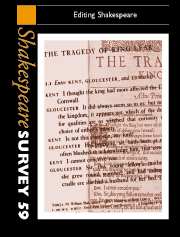Book contents
- Frontmatter
- Editing Shakespeare’s Plays in the Twentieth Century
- Crisis in Editing?
- On Being a General Editor
- Altering the Letter of Twelfth Night: ‘Some are born great’ and the Missing Signature
- ‘A Thousand Shylocks’: Orson Welles and The Merchant of Venice
- The Date and Authorship of Hand D’s Contribution to Sir Thomas More: Evidence from ‘Literature Online’
- Ferdinand’s Wife and Prospero’s Wise
- Editing Stefano’s Book
- Manuscript, Print and the Authentic Shakespeare: The Ireland Forgeries Again
- The Author, the Editor and the Translator: William Shakespeare, Alexander Chalmers and Sándor Petofi or the Nature of a Romantic Edition
- Women Edit Shakespeare
- The Shakespeare Edition in Industrial Capitalism
- Print and Electronic Editions Inspired by the New Variorum Hamlet Project
- The Evolution of Online Editing: Where Will it End?
- The Director as Shakespeare Editor
- The Editor as Translator
- Performance Editions, Editing and Editors
- Editing Collaborative Drama
- Will in the Universe: Shakespeare’s Sonnets, Plato’s Symposium, Alchemy and Renaissance Neoplatonism
- Giants and Enemies of God: The Relationship between Caliban and Prospero from the Perspective of Insular Literary Tradition
- Shakespeare’s Ages
- Who Wrote William Basse’s ‘Elegy on Shakespeare’?: Rediscovering a Poem Lost from the Donne Canon
- ‘Sometime a Paradox’: Shakespeare, Diderot and the Problem of Character
- Shakespeare Performances in England, 2005
- Professional Shakespeare Productions in the British Isles, January–December 2004
- The Year's Contributions to Shakespearian Study 1 Critical Studies
- 2 Shakespeare in Performance
- 3 Editions and Textual Studies
- Index
Editing Stefano’s Book
Published online by Cambridge University Press: 28 March 2007
- Frontmatter
- Editing Shakespeare’s Plays in the Twentieth Century
- Crisis in Editing?
- On Being a General Editor
- Altering the Letter of Twelfth Night: ‘Some are born great’ and the Missing Signature
- ‘A Thousand Shylocks’: Orson Welles and The Merchant of Venice
- The Date and Authorship of Hand D’s Contribution to Sir Thomas More: Evidence from ‘Literature Online’
- Ferdinand’s Wife and Prospero’s Wise
- Editing Stefano’s Book
- Manuscript, Print and the Authentic Shakespeare: The Ireland Forgeries Again
- The Author, the Editor and the Translator: William Shakespeare, Alexander Chalmers and Sándor Petofi or the Nature of a Romantic Edition
- Women Edit Shakespeare
- The Shakespeare Edition in Industrial Capitalism
- Print and Electronic Editions Inspired by the New Variorum Hamlet Project
- The Evolution of Online Editing: Where Will it End?
- The Director as Shakespeare Editor
- The Editor as Translator
- Performance Editions, Editing and Editors
- Editing Collaborative Drama
- Will in the Universe: Shakespeare’s Sonnets, Plato’s Symposium, Alchemy and Renaissance Neoplatonism
- Giants and Enemies of God: The Relationship between Caliban and Prospero from the Perspective of Insular Literary Tradition
- Shakespeare’s Ages
- Who Wrote William Basse’s ‘Elegy on Shakespeare’?: Rediscovering a Poem Lost from the Donne Canon
- ‘Sometime a Paradox’: Shakespeare, Diderot and the Problem of Character
- Shakespeare Performances in England, 2005
- Professional Shakespeare Productions in the British Isles, January–December 2004
- The Year's Contributions to Shakespearian Study 1 Critical Studies
- 2 Shakespeare in Performance
- 3 Editions and Textual Studies
- Index
Summary
As Walter Ong said in his study of the interface between oral and literate cultures, ‘Print encourages a sense of closure.’ Editors are bound to aim at identifying and fixing a single version of their play, chiefly for reasons that acknowledge the current dominance of the reader over the listener. They elevate the literate culture over the oral that still was just about dominant when Shakespeare composed his plays. We live now in the literate culture’s hope of attaining so-called ‘definitive’ editions, in the process closing, as Ong suggests, the range of possibilities that are inherent in any text designed for speaking rather than reading. The real problem is not so much a simple consequence of the literate culture’s prioritization of writing over speaking as the effect of long reliance on the written word for its superior precision. Writing allows precise memorization to become the top priority. The original Shakespeare company lacked such a priority and such precision. Perhaps we really are enriched by the concern our editors share, that they must fix the precise wordings of Shakespeare’s plays. But we should recognize at the same time that a lot can be lost by such a priority.
Editors need not only closure but consistency, and it can be dangerous. All modern editors assume, for instance, that Caliban must always speak in verse, despite the case that can be made against it. This assumption requires us to ignore completely the alternative that Stefano, whom he takes as his new master in 2.2, offers him instead. Much has been made in recent years of the curse that Caliban says Prospero laid on him, his language. Much less has been made, though, of the language Stefano offers him in its place. At their first meeting, at 2.2.79 (tln 1125), after wondering how such a beast came to ‘learn our language’, Stefano gives Caliban his bottle, and says ‘Here is that which will give language to you, cat.’ His cure for Trinculo’s and Caliban’s fear is his invitation to drink, that is, as he says (blasphemously), to ‘kisse the Booke’ (tln 1174). Stefano’s book has obviously different attractions to Caliban from Prospero’s. His subsequent over-use of the new book makes him drunk. Should that not mean that he gradually adopts a new language, drunken prose, in place of Prospero’s elevated verse? Such a change seems to be written as a design into Stefano’s euphemisms about a new language for Caliban through his use of Stefano’s ‘Booke’.
- Type
- Chapter
- Information
- Shakespeare Survey , pp. 91 - 107Publisher: Cambridge University PressPrint publication year: 2006

